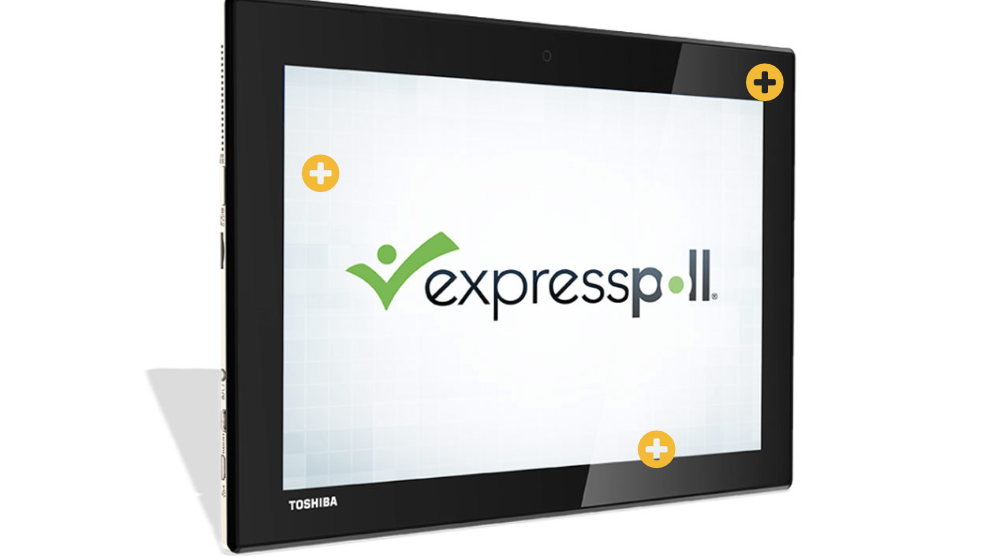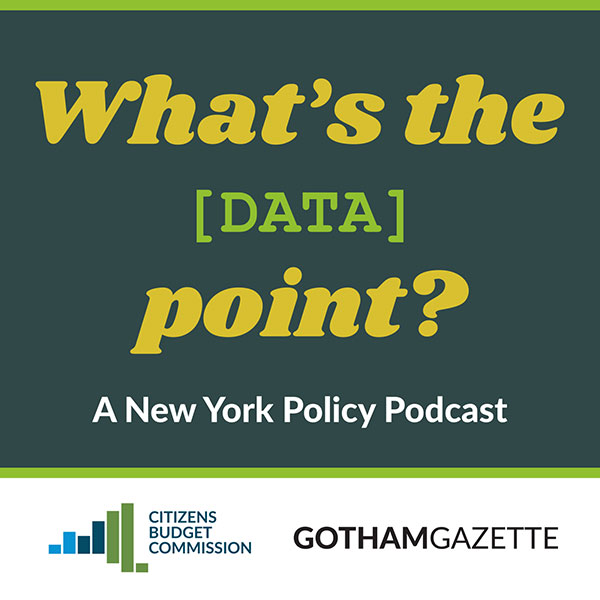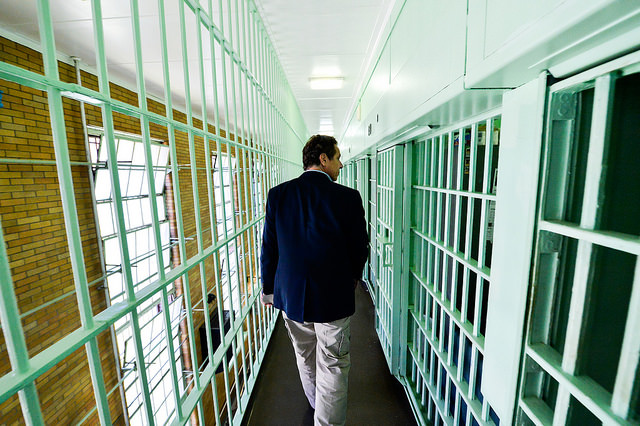Electronic Poll Books Next Step in New York Election Overhaul

(photo: Elections Systems & Software)
As Democrats in the state Legislature continue a rapid pace of passing legislation to start the new session, the state Senate seems poised to advance another round of election and voting reforms, including approving the use of electronic poll books to administer elections.
Electronic poll books, used in at least 34 states and the District of Columbia, are a fairly simple but significant instrument in making elections more efficient, experts and advocates argue. They make voting faster, preventing long lines at polling sites, save costs in the long run, and are easier to update and maintain compared to the paper lists currently used in New York.
Some advocates also say e-poll books, as they’re often called, are essential in implementing improvements to voter registration processes, which the state Legislature put into motion last month, and helpful in the implementation of the significant shift of early voting, also part of the recently-passed package.
On Monday, the state Senate’s elections committee held a vote and approved a bill allowing electronic poll books, among other items on the agenda. The bill will now head to the Senate floor for a vote. Senator Zellnor Myrie, committee chair and the sponsor of the bill, is confident e-poll books will subsequently be passed by the full Legislature, in advance of this year’s primary election in June. The legislation does not mandate the use of e-poll books.
“The larger reforms that we’ve instituted and that we’re looking at for the rest of the session are going to be made much easier by us modernizing how we see whether or not someone has voted,” Myrie said in a phone interview. “So electronic poll books is something that has wide consensus.”
When Democrats took control of the Legislature this year after flipping the Senate, they quickly passed a series of voting and elections measures including early voting, consolidating the federal and state primary to June, and preregistration of 16- and 17-year-olds. They also passed measures to amend the state constitution to implement no-excuse absentee ballots and same-day voter registration -- amendments that will require passage by the next Legislature seated in 2021 and then approval by voters through a referendum.
Advocates say that early voting and same-day voter registration in particular would be far more efficient with electronic poll books.
“Implementing early voting in New York City without electronic poll books would be an administrative disaster,” said Rachel Bloom, director of public policy and programs at Citizens Union, a government reform group. “To have effective and organized early voting in New York, we need to allow for the use of electronic pollbooks.”
Other advocates aren’t as worried but agree that electronic poll books should be the next step for the Legislature. “You don’t need to have electronic poll books to do early voting but it would make it easier,” said Jennifer Wilson, director of program and policy for League of Women Voters of New York State. She noted, for instance, that Texas implemented early voting more than a decade ago but started using electronic poll books about five years ago. But for same-day registration, she said it would be “crucial.”
Jarret Berg, executive director of the New York Democratic Lawyers Council, concurred. “I don’t think it’s an indispensable component but it certainly makes a lot of sense and I don’t see how you could do [early voting] effectively without some kind of real-time reconciliation,” he said. “We need to move away from this really sloppy paper-based system.”
The advocates do acknowledge challenges and concerns about electronic poll books. Among them is the upfront cost that local counties may have to bear for purchasing equipment, like digital tablets, on which the poll books would be stored (localities may look to the state for help in paying for such equipment). Poll workers also tend to be older and could struggle with the technology. “There’s a digital divide,” Berg conceded. Training would be necessary regardless.
There are also concerns about the security of voter lists, made that much more severe after Russia’s interference in the 2016 presidential election. Digital devices could be vulnerable to hacking, necessitating standalone devices that would not be connected to the internet and would have to be individually updated. This is similar to the electronic ballot scanners that are not internet-connected and therefore far less susceptible to hacking.
Myrie is aware of those concerns but, as the advocates also argue, says the benefits outweigh the costs. “This is really about making and administering elections much simpler,” he said. “It allows for cost savings. In the future we’re not gonna have to pay for storage of all these [paper] poll books. It is a much more efficient way to do things so that...some of the lines that we have become unfortunately very accustomed to when we go to vote are reduced by a significant measure if we make the process of checking a registration easier.”
Electronic poll books also have bipartisan support. Before Myrie took over the elections committee, Republican Senator Fred Akshar had sponsored a bill, with companion legislation put forward by Democratic Assemblymember Michael Cusick that was repeatedly passed by the Assembly. Governor Andrew Cuomo also backs the measure but some say his support would have to be backed up with funding to help counties transition to the new system, money he did not include in his executive budget proposal.
“Governor Cuomo proposed a comprehensive set of reforms in the Executive Budget to make voting easier, including authorizing electronic poll books,” Hazel Crampton-Hays, a spokesperson, said in a statement. “We will work with the legislature to identify additional resources to the extent necessary.”
Myrie is prepared to push for those resources; as some are already doing when it comes to funding early voting. It’s not clear what the initial and ongoing costs of the e-poll books may be. “Even if its a significant cost, I’ve been saying and will continue to say, to go from worst to first is gonna require some pain,” he said of New York’s voting laws.
***
by Samar Khurshid, senior reporter, Gotham Gazette
@samarkhurshid @GothamGazette
Note - This article was updated after the Senate elections committee held a vote and passed the e-poll book bill.
What's The [Data] Point? 2040, New York's Energy Sector & Plan to Go Green

What's The [Data] Point? Episode 63 -- 2040, Seth Hulkower [You can download What's The [Data] Point? wherever you get your podcasts, including on iTunes]
 2040 is the year by which Governor Andrew Cuomo wants New York’s electric sector to go entirely green; that is -- to reduce carbon dioxide emissions in that sector of energy to zero. This is the key new goal announced by the Governor as part of the state’s “Green New Deal,” and it follows other ambitious environmental targets previously established. Seth Hulkower, Principal of Strategic Energy Advisory Services and author of a recent CBC report on New York's energy consumption, production and future, joined the podcast to discuss key related issues and his findings.
2040 is the year by which Governor Andrew Cuomo wants New York’s electric sector to go entirely green; that is -- to reduce carbon dioxide emissions in that sector of energy to zero. This is the key new goal announced by the Governor as part of the state’s “Green New Deal,” and it follows other ambitious environmental targets previously established. Seth Hulkower, Principal of Strategic Energy Advisory Services and author of a recent CBC report on New York's energy consumption, production and future, joined the podcast to discuss key related issues and his findings.
Listen to the conversation and let us know what you think: Ben Max of GG (@TweetBenMax), Maria Doulis of CBC (@MariaDoulis). Listen below or download wherever you get your podcasts, and subscribe to "What's The [Data] Point?"!
***
by Ben Max, Gotham Gazette
@tweetBenMax @GothamGazette
New York Democrats on Eliminating Cash Bail: Not If, But How

(photo: the governor's office)
Taking the stage at the Global Citizen Festival in Central Park last September, Governor Andrew Cuomo promised to end cash bail “once and for all,” a move that would launch New York into the national spotlight with New Jersey and California. “In America you are still innocent until proven guilty,” he told the cheering crowd. “And that’s whether you’re black or white. That’s whether you’re rich or poor.”
The elimination of the cash bail system, under which poor black and Hispanic New Yorkers are disproportionately incarcerated pre-trial, does seem imminent thanks to a new Democratic majority in the state Senate. Assembly Speaker Carl Heastie, whose chamber last year passed legislation that only limited cash bail, assured faith leaders at Trinity Chapel in Manhattan on Thursday that, “I support a 100-percent-ending-of-cash-bail system.”
But big questions remain: who will be eligible for pretrial incarceration, what constraints will be put on judges, the reach of controversial ankle bracelets.
Cuomo’s recently-released budget proposal calls for more extensive pretrial detention and monitoring than an advocate-backed bill in the Legislature, and several Democrats told Gotham Gazette they want broad judicial discretion on domestic violence cases: a red flag for advocates who see a window for bias. As Democrats use their new power to rapidly pass progressive legislation, bail reform, in all its complexity, could prove a test of how far they’ll go.
“We have to remember there's a presumption of innocence,” warns Democratic Assemblymember Dan Quart of Manhattan. “The point of bail is not to judge or adjudicate people.”
The New York City jail population has decreased by 1,500 over the last two years, according to a December report from the Independent Commission on New York City Criminal Justice. Still, as of September more than a third of the 8,200 people in city jails were held pre-trial on misdemeanors or nonviolent felonies. More than 90 percent of the jail population is people of color. The commission, led by former chief judge Jonathan Lippman, estimates substantial bail reform could reduce the population by 3,000 people.
Deputy Senate Leader Michael Gianaris of Queens likes to remind reporters that the FREEnewyork campaign, composed of more than 150 grassroots groups, has dubbed his bail reform bill with Manhattan Assemblymember Danny O’Donnell the “gold standard.” It eliminates cash bail and was a non-starter in the Republican-controlled Senate.
Under the Gianaris/O’Donnell bill, most defendants would be released on their own recognizance. Possible exceptions include witness intimidation cases, and felony cases where the defendant is accused of attempting to seriously injure another person.
Anyone eligible for pretrial incarceration would be entitled to a hearing where a judge evaluates evidence and considers less-restrictive alternatives, like mandatory check-ins. These hearings would mark a “huge step forward,” says JoAnne Page, president of the Fortune Society, a nonprofit that provides prison reentry services. Currently, setting bail is “a decision that happens in a heartbeat.”
Cuomo’s budget proposal also eliminates cash bail and mandates pretrial hearings. However, his net of eligibility for pretrial detention is much wider, including Class A felonies like murder, conspiracy, and controlled substance charges; most violent B and C felonies like rape, assault and weapon possession (burglary and robbery are excluded); and cases where the judge deems the defendant a threat to the physical safety of someone in their family or household, regardless of the severity of the charges.
Alphonso David, Cuomo’s counsel, told Gotham Gazette that the governor intentionally excluded controversial public safety assessment tools (which Mayor Bill de Blasio has endorsed). These tools rely on data points like a defendant’s age and criminal history, and have been met with allegations of racial bias in New Jersey and California.
But if decarceration is the goal, advocates warn, the net of eligibility for pretrial incarceration must be much smaller -- lest judges balk at losing cash bail and fall back on detention.
“Unfortunately, the same decision-makers who are deciding to set bail on our clients now are going to be the ones who decide whether or not, after an evidentiary hearing, to keep that person remanded,” says Legal Aid Society attorney Marie Ndiaye. “The only thing you can do to really, really decarcerate is just by really, really limiting the number of people who could even be eligible for that kind of treatment."
Cuomo also wants electronic monitoring as an option for people charged with felonies and domestic violence misdemeanors. “When you have something like electronic monitoring there’s a very real risk that it means the expansion of social control,” warns Page, of the Fortune Society. “The threshold you pass before you put an electronic bracelet on someone is much lower than locking them up.”
Last year, the Assembly passed a proposal that would have preserved cash bail and electronic monitoring in felony and domestic violence misdemeanor cases -- a broad category that includes verbal threats. “I'll be the first one to say the Assembly bill wasn't good enough,” Heastie told advocates Thursday.
O’Donnell also dismissed the Walker bill as a relic earlier this month. “In previous years the Assembly would come up with bills we thought might pass muster in the Republican Senate,” he explained. “Those days are over. I would hope that my colleagues would come around and take this bolder approach.”
But there is still substantial Democratic support in the Assembly for the domestic violence provisions in the Walker bill. “There are going to be enough Democrats, me among them, who will be raising the issue,” said Assemblymember Amy Paulin of Scarsdale. “If we don't protect domestic violence [victims], I won't be voting for the bill.”
“Whether it's cash bail or pretrial detention I'm not worried about that,” added Assemblymember Patricia Fahy of Albany. “My interest is the bottom line…that we are not tying any judicial hands in keeping our streets safe, or our households safe.”
This is a point of entry for the state District Attorneys Association, which opposes expansive bail reform on the grounds that it curtails prosecutorial discretion. “We have serious concerns about, with the swipe of a pen, creating a proposal that has calamitous effects on public safety,” Albany County District Attorney David Soares told Gotham Gazette.
Domestic violence advocates in the FREEnewyork campaign say this logic is at odds with the ultimate goal of significantly decreasing jail populations, and relies too heavily on the perceptions of law enforcement. “Particularly for LGBTQ people,” cautions Audacia Ray of the New York City Anti-Violence project, “the way police and prosecutors perceive what is happening is often faulty and racist.”
Senate and Assembly leaders tell Gotham Gazette that they hope to come up with a compromise before budget negotiations, which are set to begin in earnest in March. A budget deal is due April 1. “The old ways of Albany involved trading one thing against an unrelated thing,” Gianaris said. “The new New York Senate is trying hard to break that mold.”
“The tricky thing with bail,” he added, “is that if we don’t do it right, things can get worse rather than better.”
***
by Emma Whitford, Gotham Gazette
@emma_a_whitford
@GothamGazette




